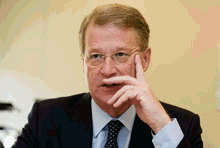
Typical street scene in Santa Ana, El Salvador. (Photo: iStock)
IMF Survey: Restoring Growth Key Priority for Europe
February 25, 2011
- Recovery in Europe's largest economies can help propel growth in wider region
- Greater focus on competitiveness needed
- Deeper financial integration would hasten recovery
Europe needs a stronger focus on rebuilding competitiveness to restore growth and create new jobs, Antonio Borges, the IMF’s new Director for Europe, said. He told IMF Survey online in a wide-ranging interview that the policy agenda should be broadened much beyond fiscal consolidation.

Tire factory in Germany, where robust growth can help propel growth in wider Europe (photo: Patrick Pleul/Newscom)
INTERVIEW ON EUROPE
Borges also noted that freeing up capital flows, through deeper financial integration, could provide powerful solutions to some of Europe’s deep-seated problems, by speeding up the reallocation of resources.
Borges joined the IMF in December 2010, leaving a position as Chairman of the Hedge Fund Standards Board in London.
IMF Survey online: How solid is Europe’s recovery? Can strong growth in Germany pull along the rest of the euro area?
Borges: There is a high likelihood that this will happen. Germany is, of course, the biggest economy in Europe, but there are many other economies in Europe that are doing well—some of them very well. All the Nordic countries are recovering, as are the Netherlands and Austria. France’s economy is also robust. The outlook is less certain in Britain, but we are confident that it too is on the right track.
In emerging Europe—in Poland, for example—there is good economic growth as well, and even the Baltic countries, where the downturn was most severe, are showing signs of recovery. The IMF is now predicting growth of 3.6 percent for central and eastern Europe in 2011.
IMF Survey online: Has Europe’s financial system undergone sufficient repair to support growth?
Borges: Obviously, the financial system is one of our main concerns, and all of us, not just in the European Department, but in the whole IMF, are focusing on strengthening the financial system, in particular the banking system. Big challenges remain.

Antonio Borges is the IMF’s new Director for Europe. He brings a mix of private and public sector experience to the job (photo: IMF)
On the one hand, as everybody knows, we still need to work through the sovereign debt crisis and address the systemic risks associated with it. On the other hand, there is, in parallel, a real revolution in terms of the new regulatory framework that is being implemented by the European Union. It’s hard to predict exactly what impact this will have on the financial system in Europe. But it will be far-reaching.
Clearly we need the financial system, and the banking sector in particular, to go back to its normal function of supporting economic activity and channeling savings to investment. All of this is now reverting back to normal, but at a pace that could be reversed if there were to be surprises.
IMF Survey online: How quickly should Europe’s advanced countries consolidate their fiscal positions?
Borges: The British have a clear plan for fiscal consolidation. How quickly they put it in place will need to be pragmatic. The Germans and the French are also giving it high priority.
"The financial system is one of our main concerns."
Countries that are already on the growth path should certainly emphasize the consolidation of public finances. There is a general consensus in Europe that this is important—that it solidifies growth, and creates a much safer and more efficient financial environment.
At the other end of the spectrum, you have countries that are in a short-term crisis. They have no choice but to be extremely serious about their fiscal policies, even though that is not the only policy they should apply. But they certainly cannot abandon their goals.
For a whole group of other countries, it’s more a question of getting the policy mix right. Countries that are moving towards stronger integration with Europe, but are not yet part of the monetary union, for example, have a broader set of policy instruments they can apply. Fiscal policy must remain an important element, but how it is applied has to be quite pragmatic.
IMF Survey online: More broadly, what steps should Europe take to boost competitiveness, reinvigorate growth, and create new jobs?
Borges: In the euro zone, the key problem is that many of the countries that face difficulties today are countries that experienced almost an illusion of economic growth―growth that could not, in fact, be sustained. A high level of spending was financed through foreign borrowing, which benefitted some of their local firms, but it was not sustainable.
Because their prosperity was so uneven and based on excessive spending, these countries gradually lost competitiveness. Unfortunately, there is no way of going back to strong long-term growth without reversing that. It may not be easy, but it’s not impossible. Germany is a case in point. The country lost competitiveness at the time of unification, and has since managed to recover it through focused policies over a few years.
Countries such as Greece and Ireland are relatively small countries, which can benefit from overall economic recovery, and grow fast provided they are able to reallocate resources quickly. Once these countries have a program in place to rebuild competitiveness, we can expect their economies to turn around relatively quickly.
For countries that are not in the euro zone, there is no question that deeper economic integration will yield benefits by encouraging a more efficient allocation of resources and using the broader European market to generate more growth.
"Countries such as Greece and Ireland are relatively small countries, which can benefit from overall economic recovery."
IMF Survey online: Should policymakers worry about inflation?
Borges: This is a tricky issue. There is a concern with headline inflation because of all the costs associated with commodities and energy prices. But long-term inflationary expectations are still very low.
For the time being, the attitude has been one of relative calm. The European Central Bank has strong credibility, and we support the current policy stance. We also have a strong euro, which helps fight inflation. But we cannot exclude the possibility of second-round inflationary effects if headline inflation increases in the context of a strong recovery.
Countries that have their own currencies, and where people in general have less confidence about the ability to control inflation, face a more serious policy challenge.
IMF Survey online: The European Union has been taking unprecedented measures to tackle the crisis. Yet markets are expecting more. Will policymakers be able to deliver enough, and on time?
Borges: The IMF and the European Union are working closely together on programs to help a number of countries in Europe. Some of these policies are unprecedented because of the measures that have been necessary given the size of the problem.
We welcome the steps the European Union has been taking to resolve the crisis. And they have indicated that they will put more ideas on the table soon. Most importantly, the countries affected by the loss of confidence have to return to a credible growth path quickly. That involves an extraordinary effort to restore competitiveness.
Beyond that, European integration has to go further. A lot of the difficulties we have now are actually the result of insufficient European integration. We have a monetary union in Europe, but we don’t really have complete freedom of capital flows, nor a large centralized fiscal authority. When you have a fully fledged monetary union, such as in the United States, local problems can be resolved more quickly. People from outside, for example, can help rebalance the situation through acquisitions, takeovers, and asset purchases.
"The countries affected by the loss of confidence have to return to a credible growth path quickly. That involves an extraordinary effort to restore competitiveness."
This process does not work all that well in Europe yet. More freedom of capital flows—deeper financial integration—could provide powerful solutions in a short period of time. If we truly want monetary union, national priorities need to allow for it.
IMF Survey online: What advice do you have for countries in central and eastern Europe, as they seek to make up for lost ground?
Borges: Many countries in emerging Europe are relatively open economies that want to modernize quickly. They are presented with an enormous opportunity to benefit from economic integration, but they are also vulnerable to the instability of markets and exchange rates.
Some of them have already experienced serious problems. When you venture outside the well-trodden path, things can go wrong quickly. As these countries modernize, they therefore have to focus rigorously on stability.
IMF Survey online: What does the future hold for the euro?
Borges: The euro is a central component of the European project. All countries benefit from the euro, especially the larger ones. It’s a much more solid project than people realize―once you have joined you cannot change your mind.
I firmly believe that the euro always will be a strong currency because of the anti-inflationary bias of its central bank and its largest members. For that reason, it will continue to serve as a reference point for monetary and price stability throughout the world.
The euro is also crucial to the development of European capital markets. We need an integrated market, a single currency, and free capital flows. We have made enormous progress but we still have far to go.
The euro is a remarkable achievement. Maybe at some point in the future, we will have more than one big currency in the world. That kind of competition would also be good for the U.S. dollar. We may achieve real reform of the international monetary system by giving investors in other countries more choice in how they allocate resources.
Borges, who holds a PhD in Economics from Stanford University, was Chairman of the Hedge Fund Standards Board in London before joining the IMF. He was Vice Chairman and Managing Director of Goldman Sachs International in London from 2000 to 2008, and Professor of Economics and Dean of the Business School at INSEAD, Fontainebleau from 1993 to 2000. He served as Deputy Governor of the Banco de Portugal during 1990-93. Borges has also been a Visiting Professor of Economics at the New University of Lisbon, Stanford University, and Portuguese Catholic University.


